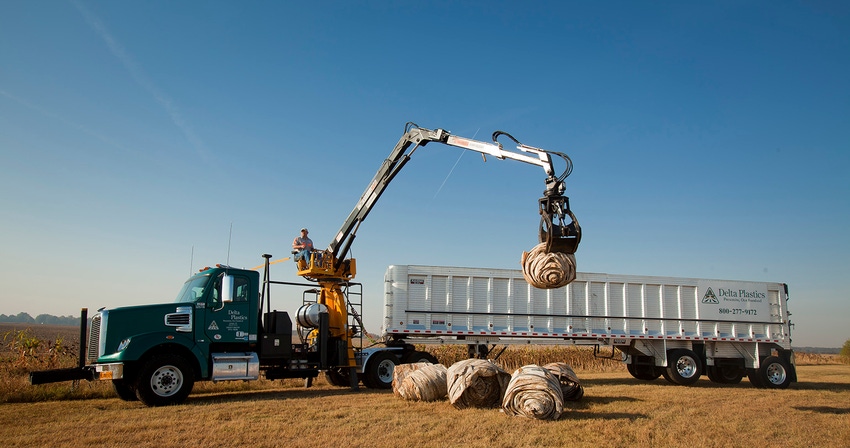March 9, 2022

Most farmers who irrigate with plastic polytubing have been happy to roll the pipe up at the end of the season, place it in a central location and have Delta Plastics, the supplier, pick up and recycle the used plastic into other products.
But that process is about to become a little more rewarding. Revolution, the umbrella company for Delta Plastics and other subsidiaries, plans to pay producers for the recycled material in 2022.
The payment will be one of several updates for the Push for Pick Up app Revolution and Delta Plastics unveiled at the Mid-South Farm and Gin Show, held Feb. 25-26 at the Renasant Convention Center in Memphis, Tenn. (To learn more about the company, visit www.revolutioncompany.com.)
“We’re the first and only company that actually makes and sells polytube here in the Delta,” said Sean Whiteley, Revolution’s CEO. “We’re the first to process and recycle used polytube. We’re the first to offer pipe in the half-mile length; the first and the only to adopt the Pipe Planner tool. We’ve spent millions and millions of dollars to develop that and will continue to do so,
“And what we are just coming out with in this growing and collecting season is we will be the first to pay the farmers for their used polytube, which is very exciting for us. We believe this will give real value to farmers.”
Pricing
Whiteley, who was interviewed prior to the Gin Show, said the company has not settled on pricing for the used plastic, “but it will be meaningful to the farmer.”
Farmers will use the Push for Pickup App on their smartphone to tell the company the location of the pipe that is ready to be picked up. As they have in the past, Delta Plastics truck drivers will come to the farm, count the number of rolls of used pipe and collect them.
“Then, we will provide a payment directly to the farmer,” he said. “We will release the specific amount of the payment as we get closer to the season. It will depend on market conditions and how things evolve, but it will be a meaningful amount. We are very excited to be offering this service and value to the farmer.”
Revolution may be a new name for Mid-South growers, many of whom have been buying plastic irrigation tubing from Little Rock, Ark.-based Delta Plastic through a network of farm supply dealers for nearly 30 years.
During that time, Delta Plastics evolved from a company selling disposable plastic tubing to one that not only sold a product but also began collecting the material from farms, transporting it to a storage area and recycling it into plastic garbage bags.
Sustainable solutions
The Revolution name will encompass several other product lines the company has begun in recent years. All involve sustainable solutions the company believe will help, well, revolutionize how products using plastic film are delivered to farmers and other consumers.
“Polypipe is the origin of our agricultural film division,” said Whiteley. “So we have a sustainable agricultural division, and polypipe continues to be a key core product there. We’ve expanded into vine cover films, mostly in California; almond hull cover film; bunker cover films sold in the upper Midwest; grain bags for grain storage here in the Mid-South and the Midwest; silo bags sold for dairies in California and the Midwest; and high tunnel and low tunnel greenhouse film.
“We make all of those products, and the unifying principle in all of them is that closed loop solution to the farmer where we make the product, and we are committed to helping our farming community. Once they are done with it we will come by and pick it up and recycle it. We eliminate the waste, and we provide a renewable cycle of evolution for that product.”
Revolution also sells trash can liners, consumer carryout bags, construction sheeting and most recently stretch film. These and other products will be recycled and newly produced by the company’s Sustainable Agriculture, Sustainable Commercial, Sustainable Consumer, Sustainable Stretch Solutions and Sustainable Materials Divisions.
How many times can it be recycled? “We’ll do it in perpetuity,” he said. “When that dairyman in the Midwest has consumed all the feed in a bunker, and the plastic is all torn up, we’ll pick it up and recycle the resin into something else.”
Expanding operation
As it has expanded, Revolution has grown from 232 employees when Whiteley joined the company 10 years ago to 1,500 employees. Besides its original manufacturing facility in Little Rock, Revolution now has eight other plants turning out its products.
A new, groundbreaking development for the company was its receipt recently of a Letter of No Objection from the U.S. Food and Drug Administration for its recycling process to “produce post-consumer recycled, linear low-density polyethylene material suitable for food contact applications.
“You have to have the FDA say this material is safe to make packaging that touches food,” said Whiteley. “If you don’t, you can’t make that food contact packaging. Getting into that market is a priority for us. It’s a project that has been five or six years in the making and a lot of time and resources to ensure our product meets the high standards of performance and safety the FDA requires.”
That doesn’t mean Revolution is forgetting its roots.
“We are not who we are without the, the support of the farmer,” he said. “The farmer in the Mississippi river Delta region is a unique breed, and we are proud to be associated with them and to represent them in the other markets we serve.
“As we grow and progress our goal is to deliver that same culture, that same kind of homegrown Arkansas, Mississippi River Delta culture to all the end markets and all the locations we serve.”
About the Author(s)
You May Also Like






